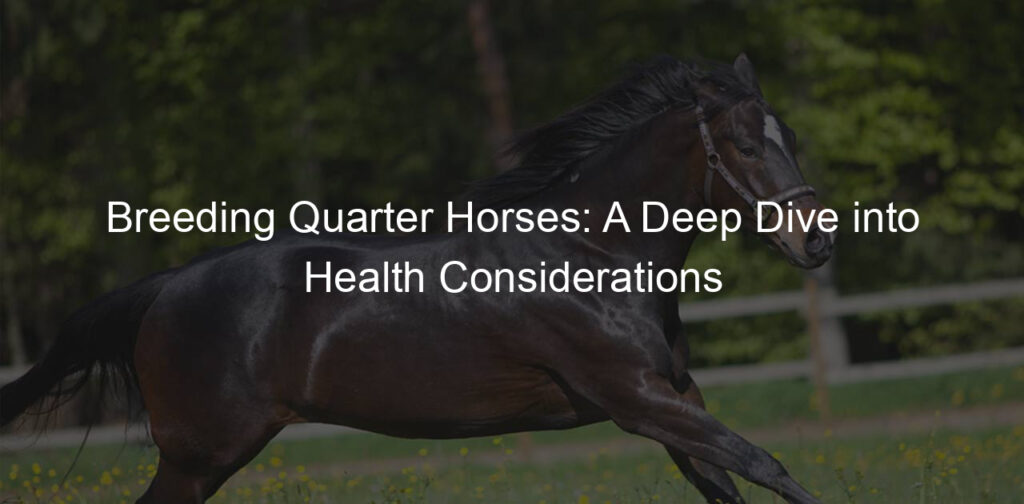Introduction to Quarter Horse Breeding
Hey there, horse lovers! Today, we’re going to chat about something really cool – Quarter Horse breeding. But before we dive into the details, let’s start with a little history lesson.
- History and Origin of Quarter Horses
- Importance of Quarter Horse Breeding
Did you know that Quarter Horses have a rich and fascinating history? They’re named “Quarter” because they’re super fast at sprinting a quarter of a mile. Cool, right?
These horses first trotted onto the scene in the 1600s, when English Thoroughbreds were bred with native American horses. The result? A horse that was not only fast, but also strong and versatile. Wikipedia has a great article if you want to learn more about their history.
So, why is Quarter Horse breeding so important? Well, it’s all about preserving those awesome traits that make Quarter Horses so special. By carefully selecting the parent horses, breeders can ensure that the next generation of Quarter Horses is just as fast, strong, and versatile as the last.
Plus, breeding is also a way to improve the health of the breed. By choosing healthy horses to parent the next generation, breeders can help to reduce the risk of genetic diseases. That’s a win for everyone!
So there you have it – a quick introduction to Quarter Horse breeding. Stay tuned for more horse-related fun facts and information in our next posts. Happy riding!
Health in Horse Breeding
When it comes to horse breeding, health is a top priority. It’s important to understand the common health issues that can arise, so you can take the necessary steps to prevent them. Let’s take a look at some of the most common health problems in horse breeding.
Common Health Issues in Horse Breeding
There are several health issues that can affect horses during breeding. Here are the three most common ones:
- Genetic Disorders
- Infectious Diseases
- Nutritional Deficiencies
These are health problems that a horse inherits from its parents. Some breeds, like the Quarter Horse, are more prone to certain genetic disorders. For example, Hyperkalemic Periodic Paralysis (HYPP) is a genetic disorder that affects the muscles of Quarter Horses. It’s important to test breeding horses for these disorders to prevent passing them on to the offspring. Learn more about HYPP here.
Infectious diseases can spread quickly among horses, especially in a breeding environment. These diseases can be caused by bacteria, viruses, or parasites. Some common infectious diseases in horses include Equine Influenza, Strangles, and Equine Herpesvirus. Vaccination and good hygiene practices can help prevent these diseases. Read more about Equine Influenza here.
Horses need a balanced diet to stay healthy. If they don’t get the right nutrients, they can develop health problems like poor growth, weight loss, and weak immune system. It’s crucial to provide horses with a diet that meets their nutritional needs, especially during breeding. Find out more about horse nutrition here.
Understanding these common health issues can help you take better care of your horses. In the next section, we’ll talk about how to prevent these problems and keep your horses healthy.
Preventive Measures for Health Issues in Horse Breeding
Keeping our beloved Quarter Horses healthy is a top priority. Let’s talk about some ways we can prevent health issues when breeding these magnificent animals.
- Vaccination
- Proper Nutrition
- Regular Health Check-ups
Vaccinations are like a shield for your horse, protecting them from harmful diseases. It’s important to keep up with your horse’s vaccination schedule. Common vaccines include those for Equine Influenza, Tetanus, and Equine Herpesvirus. Learn more about horse vaccinations here.
Just like us, horses need a balanced diet to stay healthy. This includes a mix of hay, grains, fruits, and vegetables. A well-fed horse is a happy horse! Find out more about horse nutrition here.
Regular check-ups with a vet can help catch any health issues early. It’s like going to the doctor for a yearly check-up. The vet can check your horse’s teeth, hooves, and overall health. Learn more about what a vet does here.
Remember, a healthy horse is a happy horse. Let’s keep our Quarter Horses healthy and strong!
Quarter Horse Health
When it comes to the health of our beloved Quarter Horses, there are a few specific things we need to keep an eye on. Let’s dive into some of the health considerations that are unique to this breed.
Specific Health Considerations for Quarter Horses
Like all breeds, Quarter Horses have their own set of health concerns. These can be broken down into two main categories: genetic predispositions and common diseases.
- Genetic Predispositions
- Common Diseases in Quarter Horses
Some health issues are written in a Quarter Horse’s DNA. These are called genetic predispositions, and they can make a horse more likely to develop certain conditions. For example, Quarter Horses are often genetically predisposed to a muscle disorder called Polysaccharide Storage Myopathy (PSSM). This can cause muscle stiffness, weakness, and even collapse. It’s important to know about these predispositions so we can manage them effectively.
There are also some diseases that Quarter Horses are more prone to. One of the most common is Navicular Disease, a painful condition that affects the horse’s feet. Another is Laminitis, an inflammation of the tissue inside the horse’s hoof. Both of these diseases can be managed with proper care and treatment, but early detection is key.
Remember, knowledge is power when it comes to your horse’s health. By understanding the specific health considerations for Quarter Horses, you can help your horse live a long, happy, and healthy life.
Equine Health Considerations
When it comes to keeping our Quarter Horses healthy and happy, there are a couple of things we need to pay special attention to. Let’s dive into them!
- Importance of Regular Vet Check-ups
- Role of Diet in Equine Health
Just like us humans, horses need regular check-ups too! Regular vet check-ups are super important for our four-legged friends. They can help spot any health issues early on, before they become big problems. Vets can check things like teeth, hooves, and overall body condition. They can also give vaccinations to protect against nasty diseases. According to Wikipedia, a horse should have a vet check-up at least once a year. But if your horse is older, or has health issues, it might need to see the vet more often. Remember, it’s always better to be safe than sorry!
Did you know that what a horse eats can have a big impact on its health? It’s true! A horse’s diet plays a huge role in its overall health and wellbeing. Horses need a balanced diet to stay healthy. This includes things like hay, grains, and plenty of fresh water. But, every horse is different and might need different things in its diet. For example, a young, active horse might need more calories than an older, less active horse. And, some horses might need special diets because of health issues. So, it’s always a good idea to talk to your vet about what’s best for your horse.
So there you have it, folks! Regular vet check-ups and a balanced diet are two big ways we can keep our Quarter Horses healthy. Remember, a healthy horse is a happy horse!
Breeding Healthy Quarter Horses
When it comes to breeding Quarter Horses, it’s not just about the beauty and speed. Health is equally important. Let’s dive into some of the health risks associated with horse breeding and how to avoid them.
Horse Breeding Health Risks
Like any other living beings, horses too face health risks when it comes to breeding. Here are a couple of the most common ones:
- Risks Associated with Inbreeding
- Complications during Pregnancy and Foaling
Inbreeding, or breeding horses that are closely related, can lead to a host of health problems. These can include physical deformities, reduced fertility, and a higher risk of inherited diseases. According to Wikipedia, inbreeding can also reduce genetic diversity, which can make a population more susceptible to diseases.
Pregnancy and foaling can be a stressful time for mares. Complications can arise, such as dystocia (difficult birth), retained placenta, and foal mortality. Regular vet check-ups during pregnancy can help catch and address these issues early.
Now that we know the risks, it’s important to learn how to breed healthy Quarter Horses. Stay tuned for our next section on Quarter Horse breeding tips!
Quarter Horse Breeding Tips
Hey there, horse lovers! Today, we’re going to chat about a couple of important things you need to know when it comes to breeding Quarter Horses. So, saddle up and let’s get started!
- Choosing the Right Breeding Pair
- Understanding the Breeding Cycle
First things first, we need to talk about picking the right pair for breeding. This isn’t just about picking the two prettiest horses in the stable. Nope, it’s a lot more scientific than that. You need to consider things like the horses’ health, their age, and their pedigree. It’s also important to look at their physical traits and temperaments. After all, these are things that can be passed down to the foal. So, make sure you’re choosing a pair that will produce a healthy and well-rounded foal. For more information, you can check out this Wikipedia article on Quarter Horse breeding.
Next up, let’s talk about the breeding cycle. Horses, like many other animals, have a specific breeding cycle. For mares, this is usually in the spring and summer. During this time, they go into heat every 21 days for about 4-7 days. It’s important to understand this cycle so you can plan your breeding accordingly. Remember, timing is everything!
So, there you have it, folks! A couple of key tips to keep in mind when breeding Quarter Horses. Remember, it’s all about choosing the right pair and understanding the breeding cycle. Happy breeding!
Horse Breeding Health Guidelines
When it comes to horse breeding, especially with our beloved Quarter Horses, we need to make sure we’re doing it right. That means following certain health guidelines to ensure the wellbeing of the horses. Let’s dive in!
Healthy Horse Breeding Practices
There are two key practices that are super important for healthy horse breeding. Let’s take a look at each one:
- Importance of Genetic Testing
- Benefits of a Controlled Breeding Environment
Genetic testing is like a crystal ball that lets us peek into a horse’s future health. It helps us know if a horse has any genetic disorders that could affect its health or the health of its offspring. For example, a disorder called HYPP is common in Quarter Horses. By doing genetic testing, we can find out if a horse has this disorder and make sure we don’t breed it, preventing the disorder from being passed on to the next generation. It’s a super important tool in our horse health toolkit!
When we talk about a controlled breeding environment, we mean a place where we can monitor and manage everything that affects a horse’s health and breeding. This includes things like diet, exercise, and even the horse’s social interactions. In a controlled environment, we can make sure the horse is getting the right nutrition, enough exercise, and is free from stress. This helps keep the horse healthy and increases the chances of successful breeding. Plus, it’s a great way to make sure our horses are happy!
So there you have it, folks! By doing genetic testing and maintaining a controlled breeding environment, we can ensure the health and happiness of our Quarter Horses. Remember, a healthy horse is a happy horse!
Quarter Horse Breeding Health Issues
When it comes to breeding Quarter Horses, there are a few health issues that can pop up. Let’s dive into two of the big ones: genetic disorders and infectious diseases.
- Role of Genetic Disorders in Quarter Horse Health
- Impact of Infectious Diseases on Quarter Horse Breeding
Genetic disorders can play a big role in the health of Quarter Horses. These are conditions that a horse is born with, and they can affect everything from a horse’s size and shape to its ability to move. Some common genetic disorders in Quarter Horses include Hyperkalemic periodic paralysis (HYPP) and Hereditary Equine Regional Dermal Asthenia (HERDA). These disorders can cause a range of health problems, from muscle weakness to skin issues. It’s important for breeders to be aware of these disorders and to test for them in their horses.
Infectious diseases can also have a big impact on Quarter Horse breeding. These diseases can spread from horse to horse, and they can cause a range of health problems. Some common infectious diseases in horses include Equine Infectious Anemia (EIA) and Equine Herpesvirus (EHV). These diseases can cause symptoms like fever, weakness, and even neurological problems. To prevent the spread of these diseases, it’s important for breeders to keep their horses vaccinated and to practice good biosecurity measures.
By understanding these health issues, breeders can take steps to ensure the health and well-being of their Quarter Horses. Remember, a healthy horse is a happy horse!
Conclusion
- Summary of Key Points
- Quarter Horses are a popular breed known for their speed and agility, especially in short distance races. Wikipedia has more information about their history and characteristics.
- Health is a crucial factor in horse breeding. Ensuring the health of both the mare and the stallion can lead to healthier offspring and a more successful breeding program.
- There are specific health concerns for Quarter Horses, including certain genetic conditions. Regular vet check-ups and genetic testing can help identify and manage these issues.
- Following established guidelines for horse breeding health can help ensure the wellbeing of the horses and the success of the breeding program.
- Final Thoughts on Breeding Healthy Quarter Horses
We’ve covered a lot of ground in this post, so let’s recap some of the most important points:
Breeding Quarter Horses, like any other breed, requires knowledge, dedication, and a genuine concern for the wellbeing of the animals. It’s not just about producing the fastest or the most beautiful horses. It’s about ensuring that these animals lead healthy, happy lives.
By following the guidelines we’ve discussed in this post, you can contribute to the ongoing success of the Quarter Horse breed. Remember, a healthy horse is a happy horse, and a happy horse makes for a happy breeder!









